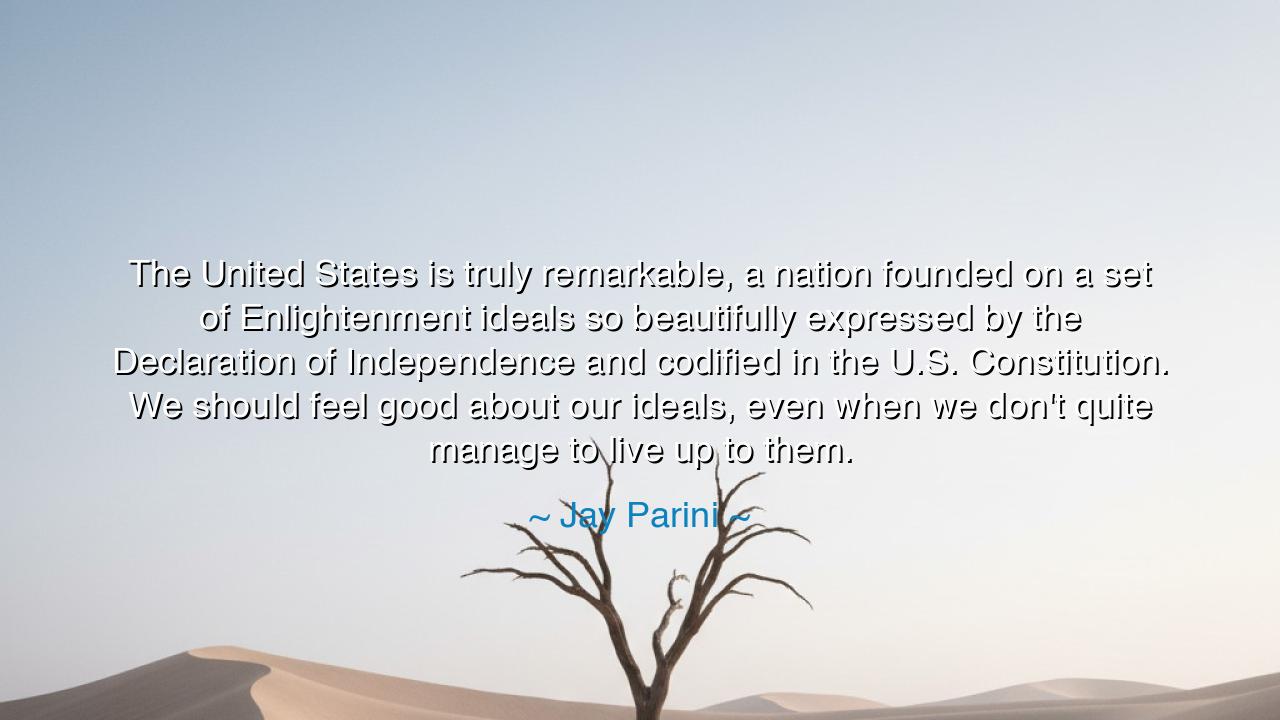
The United States is truly remarkable, a nation founded on a set
The United States is truly remarkable, a nation founded on a set of Enlightenment ideals so beautifully expressed by the Declaration of Independence and codified in the U.S. Constitution. We should feel good about our ideals, even when we don't quite manage to live up to them.






The words of Jay Parini, when he declared, “The United States is truly remarkable, a nation founded on a set of Enlightenment ideals so beautifully expressed by the Declaration of Independence and codified in the U.S. Constitution. We should feel good about our ideals, even when we don't quite manage to live up to them,” shimmer like a mirror held before both past and present. His statement is at once an homage and a confession — a recognition of the luminous ideals upon which America was founded, and a humble acknowledgment that the human journey toward those ideals remains unfinished. Beneath his reflection lies the eternal tension between aspiration and imperfection — the sacred distance between the ideal and the real.
Parini speaks of a nation born not of bloodlines or conquests, but of ideas — of Enlightenment ideals, those radiant principles born in the age when reason, liberty, and human dignity began to eclipse superstition and tyranny. The Declaration of Independence was not merely a rebellion against kings; it was a declaration of moral philosophy. It spoke of equality as the natural condition of humanity and of rights as gifts not from rulers, but from nature and nature’s God. The U.S. Constitution, following it, was the great codification — the attempt to anchor those ideals in law, to translate vision into governance. Parini’s reverence is not for perfection, but for the audacity of a people who dared to imagine that a nation could be built not upon fear or blood, but upon reason and principle.
And yet, as he wisely notes, the beauty of these ideals shines even more brightly against the shadows of failure. From its earliest days, America’s reality has not always matched its rhetoric. The same men who wrote that “all men are created equal” tolerated slavery; the same republic that proclaimed liberty denied women the vote for more than a century; the same Constitution that promised justice has at times been blind to injustice. But Parini’s words are not condemnation — they are counsel. He reminds us that to hold high ideals and fall short of them is not hypocrisy, but humanity. The test of a nation is not whether it fails, but whether it keeps striving to close the chasm between what it is and what it professes to be.
Consider the life of Abraham Lincoln, who, amid the storm of the Civil War, looked again to the Declaration of Independence as a moral compass. In his words at Gettysburg, he did not abandon the founding ideals; he reinterpreted them, renewing their meaning for a wounded people. Lincoln knew that America had not lived up to its promises — yet he believed those promises still had the power to heal. He once said, “We cannot escape history.” To him, the ideals of equality and liberty were not myths to discard, but stars to steer by, even when the sky was dark. In Lincoln’s example lies the very essence of Parini’s teaching: that reverence for ideals should not lead to complacency, but to continual renewal.
This is the paradox of great ideals — they are both gift and burden. They inspire pride, yet they demand humility. They comfort us with meaning, yet confront us with responsibility. Parini’s wisdom lies in reminding us that to “feel good about our ideals” is not to boast of perfection, but to rejoice in the compass they provide. For ideals are like mountains — their peaks may be unreachable, but their presence gives direction to every climb. The founders’ words, though imperfectly realized, remain alive because each generation must interpret and embody them anew. To abandon them in cynicism would be to extinguish the very light that guides progress.
The Enlightenment, from which America’s founding ideals sprang, taught that reason, debate, and self-correction are the lifeblood of liberty. And so, Parini’s words invite us to practice these virtues ourselves. When our society falters, let us not despair, but deliberate. When our leaders fail, let us not withdraw, but reform. When injustice appears, let us not curse the ideals, but use them as weapons against the darkness. The Declaration of Independence and the Constitution are not relics — they are living instruments, meant to be played anew by every generation that believes in freedom.
So, O listener, take this lesson to heart: cherish your ideals, even as you wrestle with your imperfections. Do not demand flawlessness of your nation, but demand faithfulness to its founding purpose — that freedom, equality, and justice are not mere words, but daily duties. In your own life, let your principles stand firm even when you falter; for to strive toward the good, though never reaching it fully, is the truest form of greatness.
Thus, the wisdom of Jay Parini endures: that America’s ideals are both its glory and its trial. They are the measure by which it must continually refine itself, the fire through which it is tested and purified. Let us then hold fast to them, not as monuments of perfection, but as living promises — a covenant between past and future, between human frailty and divine aspiration. For the worth of a nation, like the worth of a soul, is not in having achieved all it proclaims, but in never ceasing to strive toward the light.






AAdministratorAdministrator
Welcome, honored guests. Please leave a comment, we will respond soon